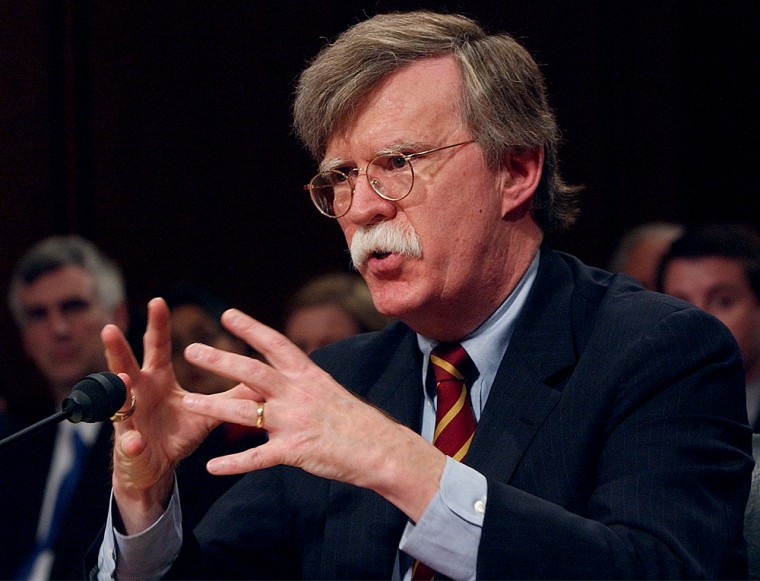John R. Bolton planned to ask then-CIA Director George Tenet to help punish a government intelligence analyst who disagreed with Bolton, and then misled a Senate committee about the matter, a Democratic Senate report said Wednesday.
Bolton pushed for months to have the analyst removed from his job or otherwise disciplined but testified under oath at his confirmation hearing to be United Nations ambassador that he “made no effort to have discipline imposed” on the man, according to details revealed for the first time in the report.
“Bolton’s effort to minimize the significance of his efforts is disingenuous,” said the report from Democrats on the Senate Foreign Relations Committee. The document is attached to a short summary of Bolton’s qualifications and an account of the Senate Foreign Relations Committee’s lengthy investigation prepared by the committee’s Republican chairman, Sen. Richard Lugar of Indiana.
State Department ‘rejects’ Democratic view
Late Wednesday the State Department said it “rejects” the Democrats' “interpretation of events” surrounding the Bolton nomination.
A State Department spokesman, Tom Casey, told NBC News “there's nothing new in this report. the committee's already reviewed this issue extensively. This is a minority interpretation of events, and we completely reject it.”
The committee investigated allegations about Bolton’s conduct and temperament for weeks before sending his name on to the full Senate for debate without the customary recommendation of approval.
“There was no evidence to support the most serious charge, that Secretary Bolton sought to manipulate intelligence,” Lugar wrote to the inquiry. “He may have disagreed with intelligence findings but in the end, he always accepted the final judgment of the intelligence community.”
Democrats: ‘Credibility problem’
Democrats on the committee oppose Bolton for the U.N. job, calling him a rigid ideologue ill-suited for the diplomatic post and a bureaucratic infighter who may have misused government intelligence. Their report, prepared for an expected vote on Bolton’s nomination, recommends that the Senate reject Bolton’s nomination.
“By itself, Mr. Bolton’s credibility problem on intelligence matters makes him the wrong man for the U.N. job at this critical time,” the Democratic report said.
In support of their allegations, the Democrats referred to e-mails and other documents that have not been publicly released.
Bolton is only the third diplomatic nominee ever to pass out of the committee without recommendation. It last happened in 1993, in the case of Larry Lawrence to be ambassador to Switzerland. Lawrence was confirmed by the Senate.
No vote scheduled
The Senate has not scheduled a vote on Bolton. Sen. Barbara Boxer, D-Calif., put a hold on the nomination last Friday, saying she did not want debate to begin in the full Senate until the State Department provided more information requested by Democrats.
“I feel as strongly as ever about my hold,” Boxer said through a spokeswoman. “We still haven’t received the information requested from the administration, and they have given every reason in the book not to cooperate.”
Boxer sent a letter to Secretary of State Condoleezza Rice on Tuesday to repeat a request for financial disclosure reports for a paid Bolton adviser who also maintains a roster of private consulting clients.
The adviser, Matthew Freedman, refused to answer questions about his clients during an interview with the committee, and the State Department has so far declined to provide the reports to the Senate committee. The department said internal ethics officials had concluded Freedman’s outside work violated no laws or regulations and there was no need to turn over the documents.
Numerous documents, interviews
The committee did receive hundreds of other documents and conducted more than 30 interviews with people who worked with Bolton, knew him or may have known about alleged incidents of abusive or inappropriate behavior going back more than a decade.
The allegations about the analyst expand on an incident that has been a major focus for Democrats. The analyst is not named in the report, presumably because he is now in an undercover job overseas, but he is widely understood to be Fulton Armstrong, a CIA employee who was the government’s leading analyst on Latin America with the National Intelligence Council.
Armstrong and Bolton tangled in 2002 over Cuba. Bolton, the State Department’s arms control chief, had accused Cuba of a vigorous drive to develop weapons of mass destruction; that view exceeded the consensus of most U.S. analysts.
“Documentary evidence provide to the committee confirms Bolton’s efforts to punish the (analyst),” the report said. “One State Department e-mail states that Mr. Bolton planned to talk to Director of Central Intelligence George Tenet about the matter,” the report said.
Armstrong was not removed from his job or otherwise reprimanded. Another analyst who disagreed with Bolton, Christian Westermann, also was not reassigned.
E-mails betray Bolton mood
The report refers to e-mails and other documents that have not been made public. One e-mail indicated Bolton worked for some time to get Armstrong transferred, an outcome that Democrats say would have been a huge black mark on the analyst’s career.
An e-mail provided to the committee “indicates that Mr. Bolton had lost patience with the delay in seeking the removal of the (analyst) and that he did not ’want it to slip away further,”’ the report said.
The report said Bolton’s office spent four months working on letters that Bolton and another top State Department official would send to CIA officials to try to get Armstrong pushed out. The report does not say whether the letters were ever sent.
In an excerpt from the full report, which runs more than 50 pages, Senate democrats' fundamental objections are made plain:
"Bolton repeatedly sought the removal of intelligence analysts who disagreed with him. In preparing speeches and testimony, Mr. Bolton repeatedly tried to stretch intelligence to fit his views. In his relations with colleagues and subordinates, Mr. Bolton repeatedly exhibited abusive behavior and intolerance for different views. And Mr. Bolton repeatedly made misleading, disingenuous or nonresponsive statements to the committee."
